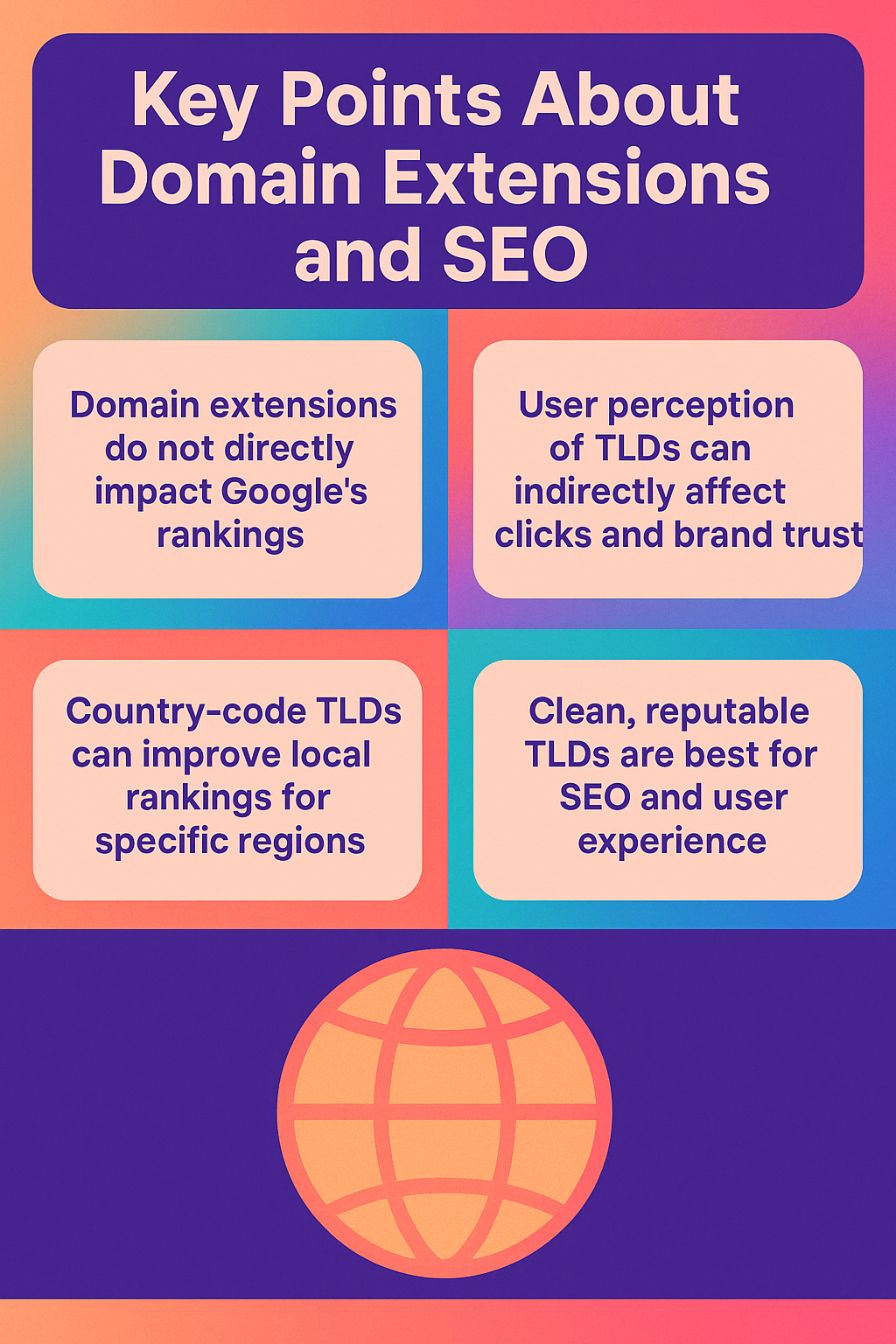Choosing a domain name is one of the earliest decisions a brand makes online.
But beyond the name itself, marketers often debate another important detail:
Does the domain extension you choose—like .com, .net, .ai, or .co—affect SEO?
This question has resurfaced in 2025 as more businesses opt for creative or industry-specific domain extensions.
With Google’s evolving search algorithms and the rapid expansion of available top-level domains (TLDs), it is worth examining whether domain extensions influence search engine rankings and organic visibility.
Here is what we know today about domain extensions and SEO—and how you should approach your domain decisions going forward.

What Are Domain Extensions?
A domain extension, also called a top-level domain (TLD), is the last part of a web address after the final dot.
Examples include:
- Traditional TLDs like .com, .org, and .net
- Country-specific TLDs like .uk, .ca, and .de
- New generic TLDs (gTLDs) like .ai, .shop, .app, and .xyz
- Specialized industry TLDs like .law, .design, or .marketing
There are now hundreds of domain extensions available, giving brands more naming flexibility than ever before.
But does your choice of extension help—or hurt—your SEO efforts?
Google’s Official Position on Domain Extensions and SEO
Google has consistently stated that domain extensions do not directly impact search rankings.
In Google’s own words:
- All TLDs are treated the same in Google’s ranking algorithms.
- Choosing a .com, .ai, .shop, or .xyz has no intrinsic advantage or disadvantage.
- What matters more is the quality of the website, not the domain extension.
John Mueller, a Search Advocate at Google, has reiterated multiple times that “there’s no ranking benefit or drawback to any particular TLD.”
In short:
From a pure algorithmic standpoint, domain extensions are neutral for SEO.
But there are important nuances that every marketer should understand before choosing a domain.
How Domain Extensions Can Indirectly Influence SEO
While Google’s systems treat all domain extensions equally, user behavior and broader brand perception can create indirect SEO effects based on your domain choice.
Here is how.
1. User Trust and Click-Through Rates (CTR)
Certain domain extensions may influence whether users trust your website enough to click.
For example:
- Users are generally more familiar with .com, .org, and .net extensions.
- Some newer TLDs (.xyz, .click, .buzz) have been associated with spammy or lower-quality sites.
- Country-specific TLDs (.uk, .ca) can boost trust among local audiences but may confuse global users.
Higher click-through rates from search results can improve SEO over time, as Google uses CTR as a user engagement signal.
Choosing a domain extension that feels credible to your target audience can indirectly support better search performance.
2. Brand Recall and Link Building
Domain memorability matters for SEO indirectly.
A clean, trustworthy-looking domain is more likely to:
- Earn backlinks naturally
- Be shared by users on social media or blogs
- Be cited by journalists and publishers
Some newer TLDs can look trendy but may also be harder for users to remember correctly, leading to lost traffic or missed mentions.
Link building remains one of the strongest ranking factors in SEO—so any domain choice that improves shareability helps your long-term organic growth.
3. Geographic Targeting with Country Code TLDs
If you are targeting a specific country, using a country-code TLD (ccTLD) can have real SEO benefits.
For example:
- A .uk domain signals to Google and users that your site serves the United Kingdom.
- A .ca domain helps for Canadian audience targeting.
Google uses ccTLDs as a strong location signal for geo-targeted search queries.
If you operate only within one country, using the appropriate ccTLD can boost local SEO performance.
However, if your goal is global reach, a generic TLD like .com or .ai may be better to avoid restricting your site’s perceived relevance.
Should You Always Choose a .com Domain?
The .com extension remains the gold standard for brand recognition, but it is not mandatory for SEO success in 2025.
Considerations:
- If you can secure your preferred brand name with a .com, it is still ideal for trust and global recognition.
- If .com is unavailable, alternative TLDs like .ai (for tech companies), .io (for startups), or .app (for apps) are now widely accepted.
- Niche TLDs like .law, .health, or .design can work well for vertical-specific branding.
Ultimately, the domain extension choice should align with:
- Your brand identity
- Your audience’s expectations
- Your broader SEO and marketing strategy
It is better to have a memorable, clean domain on a non-.com extension than a long, complicated .com domain that users cannot easily recall.
What to Avoid with Domain Extensions for SEO
While many domain extensions are fine for SEO, there are pitfalls to avoid.
1. Spam-Associated TLDs
Some TLDs have been heavily abused by spammers and low-quality sites.
Examples include:
- .info
- .biz
- .cc
If your domain is on a TLD with a poor reputation, users may hesitate to click—and search engines may apply additional scrutiny.
It is not an automatic penalty, but choosing a reputable extension makes life easier.
2. Overcomplicated Domain Names
Combining an unusual TLD with a complex domain name creates friction.
For example:
- Using lots of hyphens
- Hard-to-spell words
- Long, multi-word domains
Clarity and simplicity improve both SEO and overall user experience.
3. Mismatched Domain and Audience Expectations
If your domain extension confuses your audience about your geographic location or industry relevance, it can hurt brand trust.
Make sure your domain choice matches what your target audience expects and prefers.
How to Future-Proof Your Domain Strategy
To ensure your domain extension supports—not hinders—your SEO in 2025 and beyond:
- Choose a clean, reputable TLD
- Prioritize brand consistency and memorability
- Consider your target market’s familiarity with your chosen TLD
- Build strong content, backlinks, and technical SEO foundations, which matter far more than the TLD itself
And remember:
Domain extensions alone do not make or break your SEO success.
Great websites with valuable content and strong user engagement win regardless of whether they end in .com, .ai, or .design.
Final Thoughts: Pick Your Domain with Purpose
While domain extensions do not directly affect Google rankings, they influence how users perceive your brand—and user trust drives long-term SEO results.
If you approach your domain choice thoughtfully, prioritize quality experiences, and align with your audience’s expectations, you will build a strong SEO foundation no matter which extension you choose.
Focus less on chasing mythical SEO benefits from specific TLDs and more on creating memorable, trustworthy, and link-worthy digital experiences.
That is how you win in search, today and in the future.

Hi there! I’m Scott, and I am the principal consultant and thought leader behind Stratus Analytics. I have a Master of Science degree in marketing analytics, and I’ve have been providing freelance digital marketing services for over 20 years. Additionally, I have written several books on marketing which you can find here on Amazon or this website.
DISCLAIMER: Due to my work in the packaging industry, I cannot take on freelance clients within the packaging manufacturing space. I do not want to provide disservice to your vision or my employer. Thank you for understanding.
